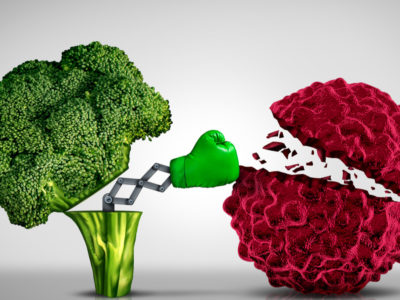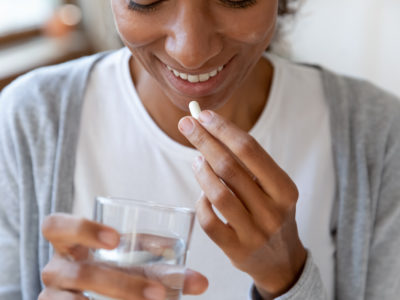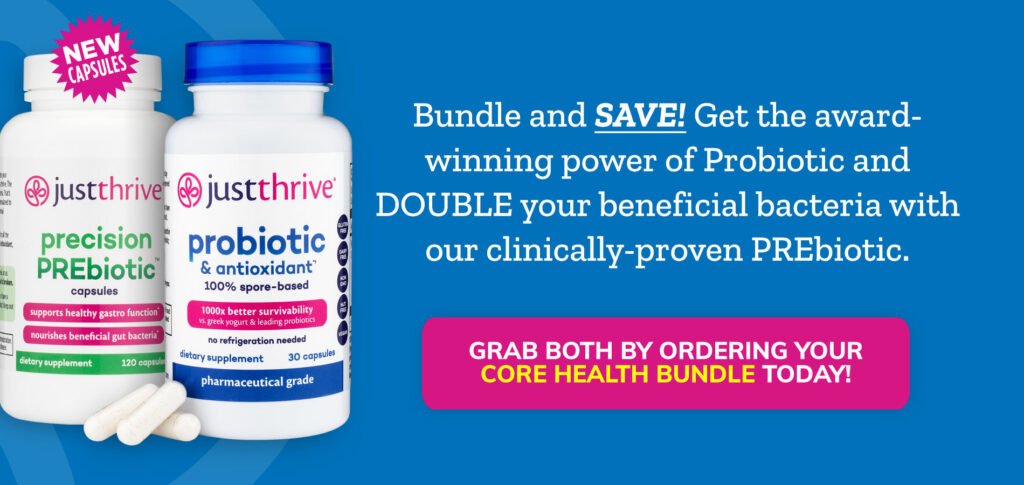Table of Contents[Hide][Show]
When you think of bacteria, it might be challenging to see them in a good light. We associate them with colds, infections… and worse. They’re the reason why we stock up on anti-bacterial hand gels and remind our kids to “sneeze into your elbow.”
Most of us do everything we can to keep bacteria at bay.
But in reality, your body is teeming with trillions of microorganisms, including fungi, parasites, viruses, and bacteria. Bacteria are found on and in your body—in your mouth, inside your nose, in your vagina, on your skin, and especially in your gut.
The good news? Some of these microorganisms are actually good for you!
There’s a big difference between good bacteria and bad bacteria. Let’s compare how they impact your health, go over the different types of bacteria you want in your system, and discuss how to get more of the beneficial strains into your body.
Good Bacteria vs. Bad Bacteria
The majority of the bacteria found in your body live in your gut. Their colonies make up what we call your gut microbiome.
And in your gut, you’ll find two types of bacteria:
- Beneficial or “good” bacteria
- Pathogenic or “bad” bacteria
In a healthy person, the two types of bacteria can coexist peacefully, making for a balanced gut microbiome.
But your gut only has so much “real estate” available for bacteria colonies. When one type (good or bad) flourishes, the other type is crowded out. Ideally, the colonies of good bacteria are the ones that will thrive, leading to an ideal equilibrium in your gut.
The Role of Good Gut Bacteria
Good bacteria are crucial in keeping your body healthy and functioning at its prime.
Some of the most important roles played by the good bacteria in your body include:
- Aiding in a healthy digestive system
- Helping you properly break down & absorb food
- Promoting a strong immune system
- Producing or aiding in the absorption of key nutrients
- Possibly preventing some chronic illnesses, including certain cancers
Related
The Undeniable Link Between Diet and Cancer
This article explores how diet and cancer are connected, which foods you should eat to fight or even prevent cancer, and which foods you should avoid.
The Effect of Bad Gut Bacteria
When your gut microbiome is off-balance, the bad bacteria take over. Their colonies grow in strength and numbers, effectively crowding out the good bacteria until they can no longer flourish.
This unwelcome state is known as dysbiosis, and it’s surprisingly common. In fact, there’s a high probability that your body is currently in dysbiosis and you just haven’t realized it yet.
Your body, however, does realize it and will let you know through subtle signs. And if you don’t pay attention and heed its warnings? Those signs will become even stronger, until your health won’t let you ignore them.
Your body will start the bacterial “warning bells” with subtle signs, including:
- Allergies
- Chronic pain
- Digestive issues such as diarrhea, constipation, bloating, gas, and nausea
- High cholesterol
- Mood swings
- Obesity
- Skin issues
If left unheeded, a gut imbalance could eventually raise some people’s risk factor for more severe illnesses and diseases, such as:
- Autism spectrum disorder
- Cardiac disease
- Chronic kidney disease
- Crohn’s disease
- Depression and anxiety
- Irritable Bowel Syndrome (IBS)
- Ulcerative colitis
All in all, when the majority of your gut bacteria are “bad” bacteria, it will negatively impact your emotional, mental, and physical health.
Why Do You Need More Good Gut Bacteria?
Your body already has beneficial bacteria, so why would it need more? As we saw, most people are already suffering, to some degree, from an imbalanced gut microbiome. But there are situations that can make it even worse.
Antibiotics
When you go to a doctor because you’re not feeling well, you may end up with a prescription for antibiotics. This will kill the bacteria causing your illness or infection.
Unfortunately, antibiotics can’t tell the difference between the good and the bad bugs. So they will also kill the colonies of good bacteria in your gut.
When you take antibiotics, it’s important to safeguard your health by replenishing your good bacteria.
Diet
Your diet can throw off your gut microbiome, too. Certain foods can kill off good bacteria, allowing bad bacteria to flourish.
Diets high in sugar and fat or low in fiber are especially bad for your gut bacteria. Instead, choose healthy, nutritious, organic foods to fill your plate.
Related
10 Foods To Exclude From Your Gut Health Diet
Plan your gut health diet and know which foods you need to avoid. Here are 10 of them you should say no to.
Age
At both ends of the age spectrum, your beneficial bacteria might be lower in quantity and quality. Younger children and older adults particularly should consume probiotic foods or supplements to maintain a healthy body, although anyone at any age benefits from probiotic sources.
Other Factors
Your body is in a constant state of flux. Its composition can change every day, and that includes your gut microbiome. Medications, stress, illness, and other factors can heavily influence the balance of your gut microbiome.
On the other hand, factors such as exercise can promote a greater variety of bacteria, which will boost your overall gut health.
The Good Gut Bacteria List
There are more than 30,000 named strains of bacteria. With so many options, how do you know which ones are the “good” ones that belong in your gut?
Here are some of the strains that will provide the strongest health benefits.
- Lactobacillus: helps digest food, creates unfavorable conditions for bad bacteria
- Bifidobacteria: helps repair stomach ulcers, treats constipation
- Streptococcus: alleviates gastrointestinal issues associated with lactose intolerance, eliminates halitosis
- Bacillus coagulans: treats gastrointestinal issues, may prevent respiratory infections and promote the immune system
How to Get Good Gut Bacteria
Colonies of beneficial bacteria are naturally present in your body. But you can strengthen them, and your health, with probiotics.
Probiotics are bacteria found in food, drinks, and supplements that are the same or close to the good bacteria in your gut. They add to the numbers of beneficial bacteria, encourage the colonies to thrive, and crowd out bad bacteria.
Let’s take a look at your best options for introducing more good gut bacteria into your system.
Foods With Good Gut Bacteria
There are two types of foods that belong on any good gut bacteria list: foods with probiotics and foods with prebiotics.
Probiotic Foods
Certain foods and drinks are known to be probiotic-friendly. Many of these are fermented foods, meaning they have been transformed from one kind of food into another, such as when cucumbers become pickles.
During this process, the bacteria that are naturally present in these foods feed on sugar and starch, creating enzymes, nutrients, and additional strains of bacteria.
When you consume these foods, these bacteria join the ones already present in your gut microbiome, for a bacterial boost.
Some of the most common probiotic foods include:
- Kefir
- Kimchi
- Kombucha
- Miso
- Pickles
- Sauerkraut
- Some soft cheeses
- Sourdough bread products
- Tempeh
- Yogurt
Prebiotic Foods
Prebiotics are a food source for probiotics. They can help probiotics multiply and do their job more effectively.
Prebiotics are mostly found in fruits and vegetables, including:
- Artichokes
- Asparagus
- Bananas
- Garlic
- Leeks
- Onions
- Soybeans
They can also be found in foods containing whole wheat.
Probiotic Supplements
Not a fan of probiotic-friendly foods? That’s okay! With their unique taste and smell—due to the fermentation process most of them have to go through—they’re not for everyone. And, you may have a special diet that makes it challenging to include these foods.
If that’s the case, then probiotic supplements are a great alternative. Probiotic pills contain live strains of beneficial bacteria. When consumed, they go to your digestive tract, shoring up your colonies of good bacteria so they can regain their strength and rebalance your gut microbiome.
But not all probiotic supplements are equal. With so many supplements available online or in stores, it pays to do your research and get the best ones for you and your health.
Here are some things to consider when choosing a probiotic supplement.
Check Strains
There are numerous strains of good bacteria, but not all of them will give you the same health-positive results.
We talked before about the most effective probiotic strains—those on our “good gut bacteria” list. If you’re already taking a probiotic supplement, you should check its label to make sure it contains one of those strains, to maximize their effectiveness.
But if you’re choosing a probiotic, the Bacillus strain is particularly powerful, especially when it’s a spore. These soil-based microorganisms are naturally found in soil, dirt, and vegetation. Spore probiotics are loaded with the rich benefits that Mother Nature intended for us!
This probiotic from Just Thrive contains four superior strains of the spore Bacillus, giving you fast, long-term results.
Survivability
Survivability plays a huge role in how effective a probiotic supplement will be.
Before it gets to your gut, your probiotic supplement has to travel a pretty treacherous path, with digestive enzymes, bile, and other roadblocks. And it has to arrive in your digestive tract strong, healthy, and ready to get to work!
Look for supplements with clinically proven survivability rates, such as our favorite one from Just Thrive. Clinical trials show it reaches your gut microbiome 100% intact.
Final Thoughts
Don’t be put off by the thought of bacteria in your body.
Bacteria can be incredibly beneficial, promoting optimal emotional, mental, and physical health. The trick is making sure that your body has high numbers of beneficial bacteria, such as the ones on our good gut bacteria list.
Stock up on probiotic foods and drinks or choose high-quality probiotic supplements to ensure that the bacterial colonies in your gut are working with you, not against you.
Your body will thank you for filling it up with the right bacteria!
You May Also Like…






